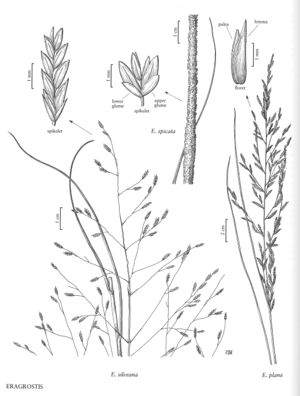Difference between revisions of "Eragrostis spicata"
imported>Volume Importer |
imported>Volume Importer |
||
| Line 39: | Line 39: | ||
|publication year= | |publication year= | ||
|special status= | |special status= | ||
| − | |source xml=https://bitbucket.org/aafc-mbb/fna-data-curation/src/ | + | |source xml=https://bitbucket.org/aafc-mbb/fna-data-curation/src/200273ad09963decb8fc72550212de541d86569d/coarse_grained_fna_xml/V25/V25_147.xml |
|subfamily=Poaceae subfam. Chloridoideae | |subfamily=Poaceae subfam. Chloridoideae | ||
|tribe=Poaceae tribe Cynodonteae | |tribe=Poaceae tribe Cynodonteae | ||
Latest revision as of 17:57, 11 May 2021
Plants perennial; cespitose, with innovations, without rhizomes. Culms 75-100 cm, erect, glabrous. Sheaths hirtellous on the margins when immature, apices glabrous or hairy shorter than 0.5 mm; ligules 0.2-0.3 mm; blades 20-40 cm long, 2-5(6) mm wide, flat to involute, glabrous abaxially, scabrous adaxially. Panicles 22-40 cm long, 0.3-0.6 cm wide, spikelike, dense; primary branches shorter than 1.2 cm, closely appressed, spikelet-bearing to the base; pulvini glabrous; pedicels 0.1-0.6 mm, mostly appressed, hirtellous. Spikelets 1.4-2.2 mm long, 0.9-1.2 mm wide, ovate, stramineous to light greenish, with 2-3 florets; disarticulation basipetal, in the rachilla below the individual florets or at the base of the florets, glumes persistent. Glumes elliptic to ovate, hyaline, keels ciliolate; lower glumes 0.7-1 mm; upper glumes 0.9-1.3 mm, apices obtuse; lemmas 1.5-2.1 mm, ovate, membranous to hyaline, apices acute to obtuse; paleas 1.1-1.6 mm, hyaline, not wider than the lemmas, apices obtuse; anthers 2, 0.3-0.4 mm, reddish-brown. Caryopses 0.7-1 mm, ellipsoid, somewhat ventrally flattened, smooth to faintly striate, reddish-brown. 2n = 40.
Discussion
Eragrostis spicata grows in moist areas in prairies, usually in deep, sandy, clay loam soils, at 0-70 m. It is native from southern Texas to Mexico and in Paraguay and Argentina. In North America, it grows with Andropogon, Quercus stellata, Prosopsis glandulosa, and Acacia.
Selected References
None.
